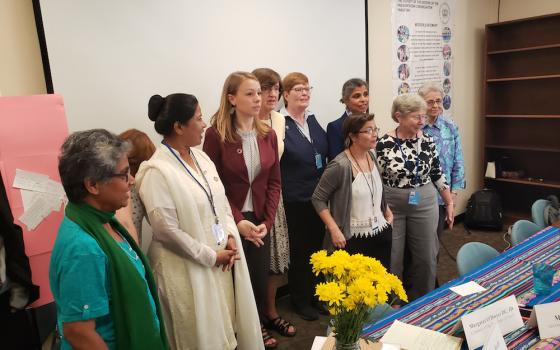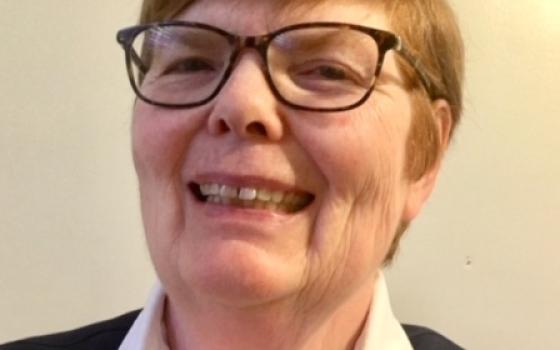A survey of people working with grassroots organizations serving vulnerable communities, and of the community residents themselves, finds that many believe inequalities have either stayed the same or worsened since the United Nations embarked on its ambitious global agenda to end poverty by 2030.
Those who responded to the survey, conducted in April and May with participation by sisters based at the United Nations, said their top five concerns are economic, health, income, social and educational inequalities. Other concerns are inequalities based on housing, politics, gender, water, security and food.
The survey is the work of the Grass Roots Task Force of the NGO Committee for Social Development, a coalition of advocacy groups working at the United Nations that includes religious congregations. It focuses on social development issues the United Nations is monitoring and tackling, such as poverty.
The cornerstone finding of the survey is that 50% of those surveyed said inequalities have stayed the same; 25% say inequalities have improved; and 20% believe inequalities have worsened. Five percent did not respond to the question.
And while 50% of those based in high-income countries were more likely to say inequality had worsened, almost 6 out of 10 respondents, 58%, of those living or working in lower-income countries said inequalities have improved.
A preliminary look at the survey's results was discussed during the United Nations' July 9-18 high-level political forum on sustainable development, an annual event to review the U.N.'s agenda to end global poverty by 2030 through the sustainable development goals, established in 2015.
The final results of the task force survey with analysis will be released in February 2020.
Members of the committee were careful to say the survey results are preliminary. They also stressed the survey is not a comprehensive, scientific-based project. However, it is a kind of snapshot of how the world looks to those who live and work at the grassroots.
"It's not an academic study. It's a grassroots study. That's its strength," said Sr. Susanne Lachapelle of LSA Family Health Services, a ministry of the Little Sisters of the Assumption based in the Harlem section of New York City and one of nine groups represented at a July 16 convening to discuss the survey.
Sr. Margaret O'Dwyer, who represents the Company of the Daughters of Charity at the United Nations and who moderated the July 16 event, told GSR after the event that the NGO Committee for Social Development "has a lot more 'mining' to do with the survey results," such as questions as to why inequalities appear to be worsening in high-income countries rather than poorer ones.
But like Lachapelle, O'Dwyer said the grassroots nature of the survey "can help influence where NGOs, governments, the private sector, or the U.N. might focus efforts in the future. Our survey involved real people, and many of their comments brought to light profound suffering which should impel us, now, to amplify efforts to end inequality."
"When a respondent mentions that their area is recovering from a long insurgency and most women lost their husbands during the war, we need to hear what widows need most in terms of support for themselves and their families," O'Dwyer said.
"When people with low incomes or those living in poverty have to take out high-interest loans in order to get health care, priorities need examination," she said. "When indigenous land is targeted for the extraction of natural resources without prior, free and informed consent, immediate protection is in order."
She added the grassroots task force seeks to bring "the voices of persons at the grassroots to the U.N."
"We're fortunate to hear many panels of speakers who are academics, diplomats and leaders in their field. But the real experts are those who actually experience poverty, homelessness, disasters, hunger, migration, trafficking and the like."
A total of 209 respondents answered the emailed survey: 25.8% from Asia; 21.5% from Latin America; 20.6% from Europe; 14.8% from North America; 13.4% from Africa; and 2.4% from Oceania.
Among the other survey's findings:
A majority of respondents said women and children suffer most, O'Dwyer said. "But youth, elder persons, persons with disabilities, migrants and refugees, LGBT persons and indigenous persons were among other groups mentioned as experiencing the greatest suffering. "
Respondents said they felt areas where there had been improvements were education, child care and maternal health, areas of focus by the U.N.'s millennium development goals, the predecessors to the sustainable development goals.
One respondent from Brazil said programs that previous national governments established to assist those with lower incomes have improved life in South America's largest nation.
"Access to school and the guarantee of receiving benefits from the family benefit program have improved," the respondent said.
Still, inequalities remain troubling throughout the world.
"Economically, life has become tough for the poor as life expenses [have] gone high and the income level down," said one respondent from Kenya.
Respondents in lower-income countries cited improvements in education and health while those in some higher-income countries said access to health care had worsened.
Still, it is clear from the survey that economic inequality and what the survey called "the worsening of people's ability to participate in economic life" remains a concern throughout the world. That was a concern expressed more from respondents in upper-income countries, 39%, than in low- and lower-middle countries, 26%.
One division the survey noted is an urban/rural divide. Respondents from cities were more likely to focus on negative economic conditions than those living outside of cities. Among the concerns those working in urban areas expressed included worsening job prospects and inadequate wages. People in poverty are struggling "to meet their basic needs," the survey said.
At the same time, life remains difficult for rural residents, with problems interconnected in a number of ways. For example, "there is a scarcity of water in the rural areas due to global warming," said one respondent in Pakistan.
The survey also noted some of the complexities in individual countries. While the sustainable development goals are encouraging countries to expand social programs and services, a respondent in Zambia noted: "Access to health care has improved in that primary health care is free, but it is not near enough to the community in most cases. People have to walk long distances to access it."
Three of the United Nations' sustainable development goals deal expressly with inequality: Goal 1, the eradication of extreme poverty; Goal 5, gender equality; and Goal 10, reducing all forms of inequality.
However, more broadly, all of the 14 goals deal directly or indirectly with the issue of inequality, as in "health, education, water, energy, dependence on resources — all are unequally accessible across the world," the NGO Committee for Social Development said during the July 16 presentation.
Presentation Sr. Rozie Yunas of Pakistan, representing the International Presentation Association, spoke of the particular problems of inequality in her predominately Muslim country, which include high rates of poverty and illiteracy, youth unemployment, bonded labor, child marriage and discrimination against religious minorities, including Christians. (Religious minorities make up less than 3% of Pakistanis.)
That impinges on educational progress. She noted that violence in 2008 in the northwest district of Swat led to a bombing of a school the Presentation sisters run. That could not, she said, "diminish the passion of Presentation sisters and their staff members for education in that area." The school was rebuilt and classes resumed, and most students are Muslim.
While the problems minorities face remain troubling, Yunas said she believes Catholic schools are important institutions for long-term peace, stability and understanding in Pakistan.
"We try to build the bridges" not only in terms of interreligious understanding but "a wider understanding of the importance of education," particularly for girls, she said in an interview with GSR.
The education for girls Catholic institutions offer are "opening a door for them": Some graduates become doctors, lawyers, teachers and political leaders.
Fellow Presentation Sr. Elsa Muttathu, who is the United Nations representative of the International Presentation Association, said despite some progress, national governments should provide a "baseline" of education for all children, which is why she and others remain focused on monitoring the progress of the sustainable development goals nation by nation.
In the end, Muttathu said, religious congregations like hers "can only offer 'pockets' of help."
[Chris Herlinger is GSR international correspondent. His email address is [email protected].]



